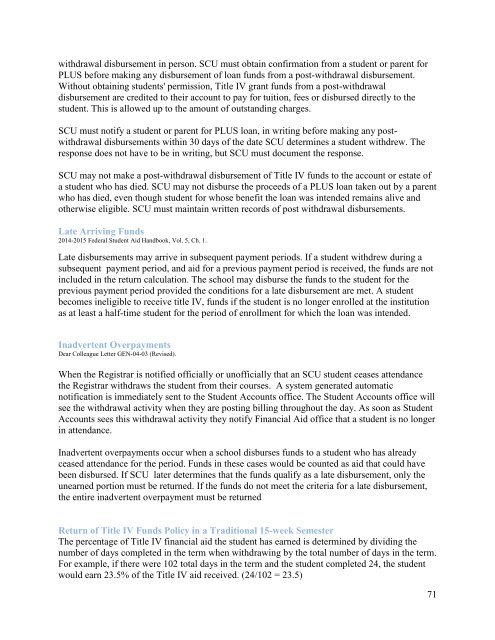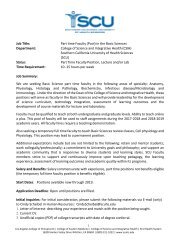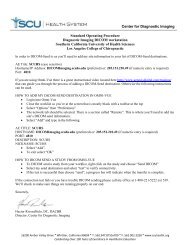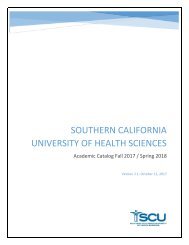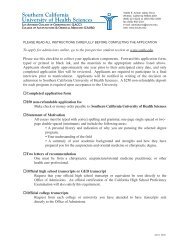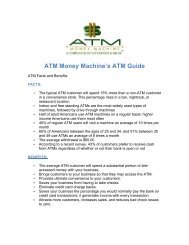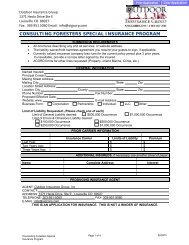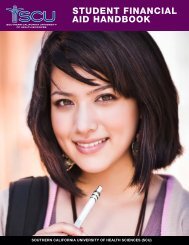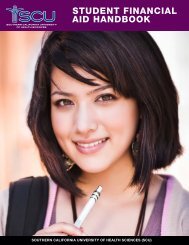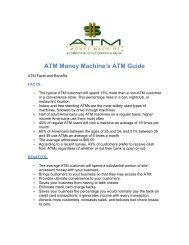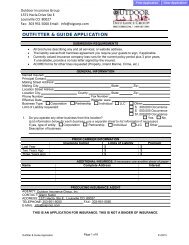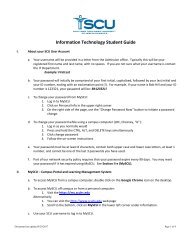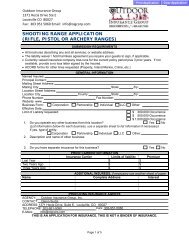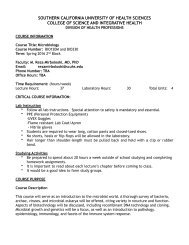Southern California University of Health Sciences - Consumer Information Guide
SCU distributes this Consumer Information Guide which includes a notice of the availability of information required pursuant to specific requirements under the Higher Education Opportunity Act. Read this PDF and know SCUHS consumer information guide.
SCU distributes this Consumer Information Guide which includes a notice of the availability of information required pursuant to specific requirements under the Higher Education Opportunity Act. Read this PDF and know SCUHS consumer information guide.
You also want an ePaper? Increase the reach of your titles
YUMPU automatically turns print PDFs into web optimized ePapers that Google loves.
withdrawal disbursement in person. SCU must obtain confirmation from a student or parent for<br />
PLUS before making any disbursement <strong>of</strong> loan funds from a post-withdrawal disbursement.<br />
Without obtaining students' permission, Title IV grant funds from a post-withdrawal<br />
disbursement are credited to their account to pay for tuition, fees or disbursed directly to the<br />
student. This is allowed up to the amount <strong>of</strong> outstanding charges.<br />
SCU must notify a student or parent for PLUS loan, in writing before making any postwithdrawal<br />
disbursements within 30 days <strong>of</strong> the date SCU determines a student withdrew. The<br />
response does not have to be in writing, but SCU must document the response.<br />
SCU may not make a post-withdrawal disbursement <strong>of</strong> Title IV funds to the account or estate <strong>of</strong><br />
a student who has died. SCU may not disburse the proceeds <strong>of</strong> a PLUS loan taken out by a parent<br />
who has died, even though student for whose benefit the loan was intended remains alive and<br />
otherwise eligible. SCU must maintain written records <strong>of</strong> post withdrawal disbursements.<br />
Late Arriving Funds<br />
2014-2015 Federal Student Aid Handbook, Vol. 5, Ch. 1.<br />
Late disbursements may arrive in subsequent payment periods. If a student withdrew during a<br />
subsequent payment period, and aid for a previous payment period is received, the funds are not<br />
included in the return calculation. The school may disburse the funds to the student for the<br />
previous payment period provided the conditions for a late disbursement are met. A student<br />
becomes ineligible to receive title IV, funds if the student is no longer enrolled at the institution<br />
as at least a half-time student for the period <strong>of</strong> enrollment for which the loan was intended.<br />
Inadvertent Overpayments<br />
Dear Colleague Letter GEN-04-03 (Revised).<br />
When the Registrar is notified <strong>of</strong>ficially or un<strong>of</strong>ficially that an SCU student ceases attendance<br />
the Registrar withdraws the student from their courses. A system generated automatic<br />
notification is immediately sent to the Student Accounts <strong>of</strong>fice. The Student Accounts <strong>of</strong>fice will<br />
see the withdrawal activity when they are posting billing throughout the day. As soon as Student<br />
Accounts sees this withdrawal activity they notify Financial Aid <strong>of</strong>fice that a student is no longer<br />
in attendance.<br />
Inadvertent overpayments occur when a school disburses funds to a student who has already<br />
ceased attendance for the period. Funds in these cases would be counted as aid that could have<br />
been disbursed. If SCU later determines that the funds qualify as a late disbursement, only the<br />
unearned portion must be returned. If the funds do not meet the criteria for a late disbursement,<br />
the entire inadvertent overpayment must be returned<br />
Return <strong>of</strong> Title IV Funds Policy in a Traditional 15-week Semester<br />
The percentage <strong>of</strong> Title IV financial aid the student has earned is determined by dividing the<br />
number <strong>of</strong> days completed in the term when withdrawing by the total number <strong>of</strong> days in the term.<br />
For example, if there were 102 total days in the term and the student completed 24, the student<br />
would earn 23.5% <strong>of</strong> the Title IV aid received. (24/102 = 23.5)<br />
71


